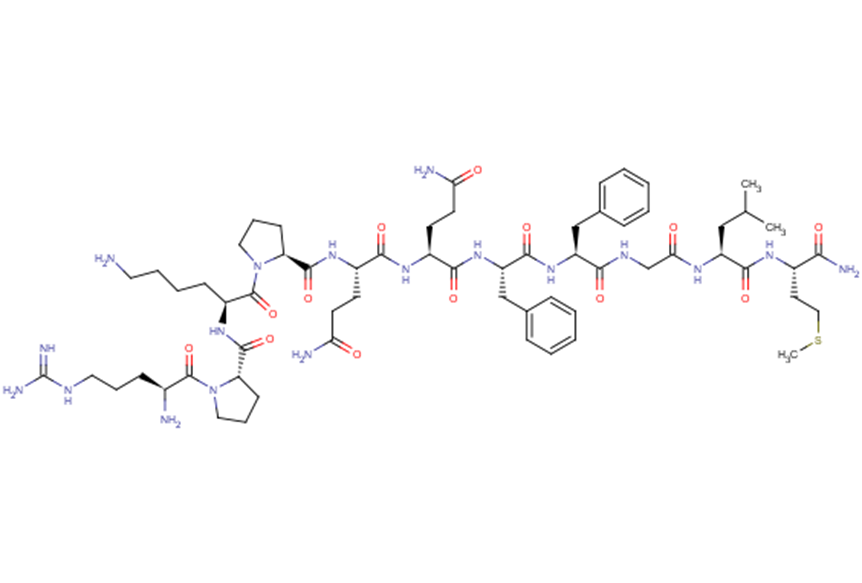
Substance P
CAS No. 33507-63-0
Substance P( —— )
Catalog No. M29786 CAS No. 33507-63-0
Substance P (SP) is an undecapeptide (a peptide composed of a chain of 11 amino acid residues) member of the tachykinin neuropeptide family.
Purity : >98% (HPLC)
 COA
COA
 Datasheet
Datasheet
 HNMR
HNMR
 HPLC
HPLC
 MSDS
MSDS
 Handing Instructions
Handing Instructions
| Size | Price / USD | Stock | Quantity |
| 5MG | 106 | In Stock |


|
| 10MG | 169 | In Stock |


|
| 25MG | 360 | In Stock |


|
| 50MG | 536 | In Stock |


|
| 100MG | 764 | In Stock |


|
| 200MG | Get Quote | In Stock |


|
| 500MG | Get Quote | In Stock |


|
Biological Information
-
Product NameSubstance P
-
NoteResearch use only, not for human use.
-
Brief DescriptionSubstance P (SP) is an undecapeptide (a peptide composed of a chain of 11 amino acid residues) member of the tachykinin neuropeptide family.
-
DescriptionSubstance P (SP) is an undecapeptide (a peptide composed of a chain of 11 amino acid residues) member of the tachykinin neuropeptide family.
-
In Vitro——
-
In Vivo——
-
Synonyms——
-
PathwayOthers
-
TargetOther Targets
-
RecptorHuman Endogenous Metabolite
-
Research Area——
-
Indication——
Chemical Information
-
CAS Number33507-63-0
-
Formula Weight1347.63
-
Molecular FormulaC63H98N18O13S
-
Purity>98% (HPLC)
-
SolubilityIn Vitro:?DMSO : 25 mg/mL (18.55 mM)
-
SMILES——
-
Chemical Name——
Shipping & Storage Information
-
Storage(-20℃)
-
ShippingWith Ice Pack
-
Stability≥ 2 years
Reference
molnova catalog



related products
-
CL-278474
CL-278474 (compound I-79) is a potent inhibitor of β-N-acetylhexosaminidase OfHex1. CL-278474 can be used in control of insect.
-
1,2-Distearoyl-sn-gl...
L-ALPHA-PHOSPHATIDYLCHOLINE, DISTEAROYL is a cylindrical-shaped lipid used to synthesize liposomes. L-ALPHA-PHOSPHATIDYLCHOLINE, DISTEAROYL is the lipid component in the lipid nanoparticle (LNP) system.
-
(2R,3S)-Dihydrodehyd...
(2R,3S)-Dihydrodehydroconiferyl alcohol can induce neurite outgrowth and enhance NGF-induced neurite outgrowth from PC12 cells by amplifying up-stream steps such as MAPK and PKC.



 Cart
Cart
 sales@molnova.com
sales@molnova.com


